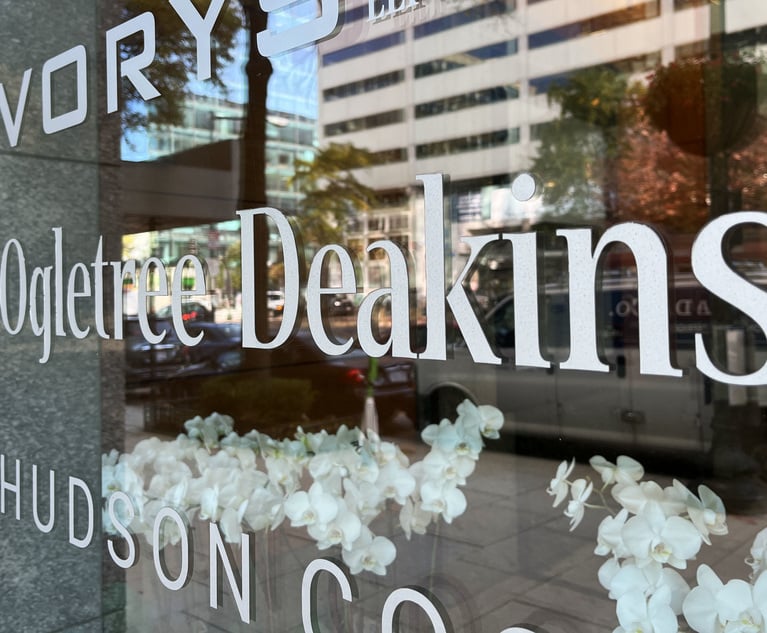Can An Employer Fire A White Supremacist?
Social media users have taken to outing protesters who over the weekend participated in a white nationalist rally in Charlottesville, Virginia,…
August 14, 2017 at 06:59 PM
6 minute read
 Neo-Nazis, white supremacists and other alt-right factions during a “Unite the White” rally near Emancipation Park (formerly Lee Park) in downtown Charlottesville, Virginia.
Neo-Nazis, white supremacists and other alt-right factions during a “Unite the White” rally near Emancipation Park (formerly Lee Park) in downtown Charlottesville, Virginia.
Social media users have taken to outing protesters who over the weekend participated in a white nationalist rally in Charlottesville, Virginia, that quickly turned violent and raised the national consciousness about the rise of the “alt-right” and racism in the U.S.
In the aftermath of the “Unite the Right” rally and a counterprotest this weekend, at least one of the protesters was fired by his employer, according to reports.
Employment attorneys say the naming of the white nationalist protesters, as well as another recent incident at Google involving a controversial memo on gender and tech, expose difficult legal questions about what kinds of views and speech would be protected and whether workers have standing to sue. There are several issues to consider, including free speech, protected or concerted speech and a private employer's right to hire and fire workers under federal labor and civil rights laws.
In the aftermath of the violence in Charlottesville, a California man, Cole White, was identified by Internet users as a participant in the white nationalist rally. His employer, Top Dog, announced he no longer works at the Berkeley restaurant because the management does not support his views.
More firings could follow, as a Twitter page ”Yes You're Racist” has attempted to name and shame the white nationalists who attended the rally Friday night and Saturday.
This public shaming of those involved in the protest comes shortly after a Google engineer was terminated by the tech giant for a controversial memo that, among other things, decried the company's diversity efforts and said women were not biologically suited for the technology industry.
Employers trying to decide how to cope with a white supremacist or someone holding other discriminatory views have to consider their jurisdiction and the nature of the employee's speech and affiliation.
A few local governments maintain protections for employees' political affiliations, including in Washington, D.C., Puerto Rico, the Virgin Islands and Wisconsin. But political views are not a protected class under federal Title VII civil rights protections, unlike factors such as race, sex or religion.
Government employees do have a right to free speech, but are limited in terms of what they can say in the workplace. Workers at private employers have less leeway under the law to say whatever they please.
“If an employer is watching television news — like what happened [in Charlottesville] — and sees one of his or her employees on either side of the barricades, there is nothing that protects those workers, unless they fall into another protected class,” said Richard Cohen, an employment attorney with FisherBroyles.
But, Cohen said, there may be a loophole for an employee looking to defend their speech, even if it is racist, sexist or discriminatory in another fashion. It could be a stretch to prove, he noted, but such language could be considered defensible under Title VII simply because it has to do with a protected characteristic.
“Whether or not you agree with one or the other or the incident horrified you, it can be argued, at least from a civil rights point of view, it was protected activity,” he said.
He said, on the flip side, an employer could act on an employee taking on discriminatory behavior if the views would be harmful to other workers and constitute a violation of Title VII. He said social media has also broadened this particular debate because employers can now often see the personal views that workers espouse online.
The National Labor Relations Board could also weigh in on this issue and has widened the definition under the Obama administration of what is considered protected activity, said Donald Schroeder, a partner with Foley & Lardner.
He noted a case out of the U.S. Court of Appeals for the Eighth Circuit in which an employee was fired for making racist comments while on a picket line in Cooper Tire & Rubber v NLRB. An NLRB administrative law judge held that Cooper Tire violated the National Labor Relations Act by terminating the employee for his speech and the Eighth Circuit affirmed.
“The view of protected activity expanded under the Obama administration, particularly regarding social media,” Schroeder said. “That is another consideration to take into account when determining what to do with an employee.”
He said, however, that if a company saw an employee in the workplace or outside it acting in a discriminatory way, there is nothing to prevent the manager from taking steps to terminate employment. The employee would have to argue that it's a protected racial issue.
“It's one thing to engage in a peaceful march, it's another to engage in bottle throwing and a violent march with slurs and vulgar language,” he said. “Could they bring a Title VII case? Sure, but I think it would be extremely difficult to move it forward.”
Employers should be cognizant about whether speech by employees is addressing conditions of work or terms of employment and would be considered “concerted activity,” said Alan Model, a shareholder at Littler Mendelson. Yet, he said the speech also should not interfere with any company harassment policies.
He said he has not seen cases in which an employee has argued that their views as a white nationalist should be protected by federal civil rights laws.
“There is a lot of discussion about political issues and divisiveness going on in the country right now,” Model said. “Employers should be mindful and protect their workplace from a harmful environment.”
Matthew Feery, an employment attorney with Much Shelist in Chicago, said it's important to note that this is not an “either side” issue for most employers, but rather a clear-cut issue on which there is a right side and a wrong side.
“Apart from the legal issues involved, employers should consider the effect of their decision — or nondecision — on their workforce and business operations,” Feery said. “Employers understandably may decide that the potential liability from termination may be outweighed by the practical effects of retaining the employee in question, especially with respect to employee morale, workplace harmony, and the employer's reputation.”
This content has been archived. It is available through our partners, LexisNexis® and Bloomberg Law.
To view this content, please continue to their sites.
Not a Lexis Subscriber?
Subscribe Now
Not a Bloomberg Law Subscriber?
Subscribe Now
NOT FOR REPRINT
© 2024 ALM Global, LLC, All Rights Reserved. Request academic re-use from www.copyright.com. All other uses, submit a request to [email protected]. For more information visit Asset & Logo Licensing.
You Might Like
View All
‘A Force of Nature’: Littler Mendelson Shareholder Michael Lotito Dies At 76
3 minute read
Employers Scramble to Get Immigration Records in Order Ahead of Trump Crackdown
6 minute read

Hospital Succeeds in Denying Vaccine Religious Accommodation Through 'Undue Hardship' Defense
Trending Stories
- 1Tuesday Newspaper
- 2Judicial Ethics Opinion 24-85
- 3Decision of the Day: Administrative Court Finds Prevailing Wage Law Applies to Workers Who Cleaned NYC Subways During Pandemic
- 4Trailblazing Broward Judge Retires; Legacy Includes Bush v. Gore
- 5Federal Judge Named in Lawsuit Over Underage Drinking Party at His California Home
Who Got The Work
Michael G. Bongiorno, Andrew Scott Dulberg and Elizabeth E. Driscoll from Wilmer Cutler Pickering Hale and Dorr have stepped in to represent Symbotic Inc., an A.I.-enabled technology platform that focuses on increasing supply chain efficiency, and other defendants in a pending shareholder derivative lawsuit. The case, filed Oct. 2 in Massachusetts District Court by the Brown Law Firm on behalf of Stephen Austen, accuses certain officers and directors of misleading investors in regard to Symbotic's potential for margin growth by failing to disclose that the company was not equipped to timely deploy its systems or manage expenses through project delays. The case, assigned to U.S. District Judge Nathaniel M. Gorton, is 1:24-cv-12522, Austen v. Cohen et al.
Who Got The Work
Edmund Polubinski and Marie Killmond of Davis Polk & Wardwell have entered appearances for data platform software development company MongoDB and other defendants in a pending shareholder derivative lawsuit. The action, filed Oct. 7 in New York Southern District Court by the Brown Law Firm, accuses the company's directors and/or officers of falsely expressing confidence in the company’s restructuring of its sales incentive plan and downplaying the severity of decreases in its upfront commitments. The case is 1:24-cv-07594, Roy v. Ittycheria et al.
Who Got The Work
Amy O. Bruchs and Kurt F. Ellison of Michael Best & Friedrich have entered appearances for Epic Systems Corp. in a pending employment discrimination lawsuit. The suit was filed Sept. 7 in Wisconsin Western District Court by Levine Eisberner LLC and Siri & Glimstad on behalf of a project manager who claims that he was wrongfully terminated after applying for a religious exemption to the defendant's COVID-19 vaccine mandate. The case, assigned to U.S. Magistrate Judge Anita Marie Boor, is 3:24-cv-00630, Secker, Nathan v. Epic Systems Corporation.
Who Got The Work
David X. Sullivan, Thomas J. Finn and Gregory A. Hall from McCarter & English have entered appearances for Sunrun Installation Services in a pending civil rights lawsuit. The complaint was filed Sept. 4 in Connecticut District Court by attorney Robert M. Berke on behalf of former employee George Edward Steins, who was arrested and charged with employing an unregistered home improvement salesperson. The complaint alleges that had Sunrun informed the Connecticut Department of Consumer Protection that the plaintiff's employment had ended in 2017 and that he no longer held Sunrun's home improvement contractor license, he would not have been hit with charges, which were dismissed in May 2024. The case, assigned to U.S. District Judge Jeffrey A. Meyer, is 3:24-cv-01423, Steins v. Sunrun, Inc. et al.
Who Got The Work
Greenberg Traurig shareholder Joshua L. Raskin has entered an appearance for boohoo.com UK Ltd. in a pending patent infringement lawsuit. The suit, filed Sept. 3 in Texas Eastern District Court by Rozier Hardt McDonough on behalf of Alto Dynamics, asserts five patents related to an online shopping platform. The case, assigned to U.S. District Judge Rodney Gilstrap, is 2:24-cv-00719, Alto Dynamics, LLC v. boohoo.com UK Limited.
Featured Firms
Law Offices of Gary Martin Hays & Associates, P.C.
(470) 294-1674
Law Offices of Mark E. Salomone
(857) 444-6468
Smith & Hassler
(713) 739-1250










